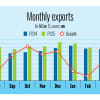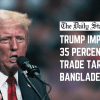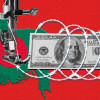Exports hit record $5.7b in January

The merchandise exports rebounded strongly in January as manufacturers shipped goods worth $5.72 billion, the highest in a single month, which, coupled with a rise in remittances and a fall in imports, could ease pressure on the economy.
The previous single month high was recorded in December last year when exporters sold products to the tune of $5.30 billion, data from the Export Promotion Bureau (EPB) showed yesterday.
In a positive development, the remittance flow rose to a seven-month high in the first month of the year. Imports fell 22.41 percent in November, the latest for which data from the central bank was available.
Higher imports against lower-than-expected exports and remittances have been behind the current economic crisis of Bangladesh as foreign currency reserves have depleted, the taka has taken an unprecedented plunge and inflation has hovered around a record level.
January's export receipts were up 11.45 percent year-on-year, riding on the higher sales of garment items, which account for 85 percent of national shipments.
Suppliers say the export of garment items rose in the western world as inflationary pressure fell due to the intervention by the European and US governments.
The disposable income of consumers has improved, sending sales during festivals such as Christmas, higher towards the end of 2023 than in 2022, they say.
This shows an improvement following a sharp fall in income in 2021 and 2022 because of the severe fallout of the Covid-19 pandemic and the Russia-Ukraine war. The sales of consumer goods like garments fell and the stock of unsold apparel items piled up in those years.
Sales recovered in the last quarter of 2023 and the old inventory declined, raising the shipment of garments to the western markets.
"Exporters produced more items as the normalcy was restored in January following the announcement of the new wage structure for apparel workers," said Faruque Hassan, president of the Bangladesh Garment Manufacturers and Exporters Association (BGMEA).
He says the outlook is bright as the deep uncertainty involving the general elections is over and international clothing retailers and brands have started making fresh inquiries.
According to the BGMEA chief, the unit price of garment items sourced from Bangladesh has inched up riding on the gradual shift to high-value products from basic and medium ranged apparel.
In another development, the emerging market is showing immense potential as the shipment of garment items to new destinations is on the rise and reached nearly $9 billion last year.
Bangladesh considers the destinations except the US, the UK, the EU and Canada as emerging markets.
Hassan, however, warns that the lowering of cash incentives on export receipts may discourage the exporters from exploring new markets.
The government has cut the export subsidy for almost all sectors to reduce the pressures on Bangladesh's coffers and bring down the rates gradually since the country can't provide such subsidies once it becomes a developing nation.
Speaking to The Daily Star, Senior Commerce Secretary Tapan Kanti Ghosh said higher sales during Christmas helped ship a higher amount of goods.
The overall shipment stood at $33.26 billion in July-January, the first seven months of the current financial year, an improvement of 2.52 percent year-on-year, according to the EPB.
Garment shipment increased 3.45 percent to $28.36 billion. Knitwear exports rose 8.15 percent to $16.17 billion and woven sales declined 2.20 percent to $12.18 billion.
The export of agricultural products increased 4.44 percent to $572.72 million.
Cotton waste export rocketed 61.42 percent to $314.57 million while the shipment of non-leather footwear edged up 2.57 percent to $296.24 million.
Leather and leather goods saw their sales decline by 14.33 percent to $628.06 million. Jute and jute goods export fell 6.85 percent to $510.54 million.
The export of home textiles dipped 34.37 percent to $454.74 million.
If the exports and remittances maintain their current momentum, the imports remain in check, and the financial account of the balance of payments sees vast improvement on the back of higher external investments and long-term loans, Bangladesh might finally see an end to a crisis that has been haunting its citizens for the past two years, according to experts.

 For all latest news, follow The Daily Star's Google News channel.
For all latest news, follow The Daily Star's Google News channel. 








Comments